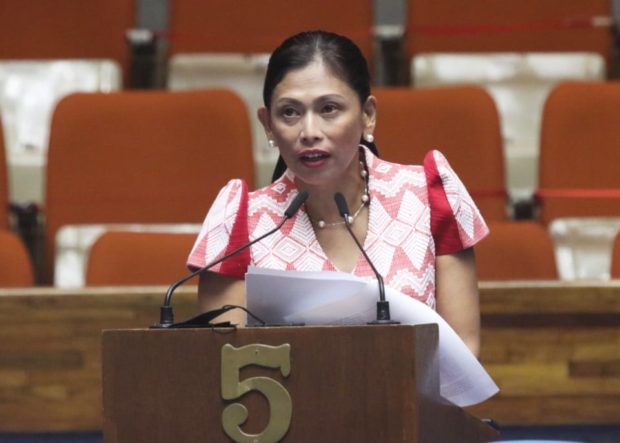
Marikina 2nd District Rep. Stella Quimbo delivers a privilege speech on Monday, November 16, 2020 at the House of Representatives. (File photo from the House of Representatives)
MANILA, Philippines — Marikina 2nd District Rep. Stella Quimbo has called for the lowering of workers’ contributions to the Philippine Health Insurance Corporation (PhilHealth).
She said the state-run insurer already gets enough money annually from its earnings and appropriated budget.
Quimbo made the call on Wednesday during a hearing before the House of Representatives Committee on Health regarding the proposed amendments to the Universal Health Care (UHC) Act.
According to Quimbo, PhilHealth’s gross margin in 2023 was P173.4 billion, coming from its social health insurance program alone.
This figure pertains to allocations under the national budget and other investment revenues are not included.
“First of all, Mr. Chair, I think it’s time to re-calibrate the premium rates. The premium rates are simply too high,” she pointed out.
“So, PhilHealth is earning too much because the premium rates are high, but those who pay the premiums — the workers — are at the losing end,” Quimbo said when she sponsored her proposed bill.
“So, what is our evidence here? We can see the huge earnings of PhilHealth,” she said.
“For example, 2023 reports would show that PhilHealth is expected to generate a gross margin of P173.4 billion only from the social health insurance program — not including income from investments,” she noted.
“Every year, they not only collect premiums from workers. They also get very huge appropriations from Congress,” she explained.
Quimbo said around P80 billion is allocated for premium subsidies, and P20 billion for benefit expansion.
However, the services given to beneficiaries do not at all match the huge earnings, as evidenced by the high out-of-pocket expenses by patients.
“But ironically, the benefit spending is too (high). The benefits that we, as members receive, are too low. How do we know that? Out of pocket spending is too (high)[…],” the lawmaker revealed.
“And, in fact, when we visit hospitals, patients have to seek help from the Malasakit (Center) and recently we relied on the MAIP (Medical Assistance to Indigent Patients),” Quimbo observed.
“The help we get from MAIP is bigger, ironically, compared to PhilHealth,” she reported.
PhilHealth’s method of determining the premiums that contributors should pay, as Quimbo said that seems to be no definite formula for that.
“The question is, ‘Why can’t we decrease the contributions sourced by PhilHealth from workers?” she asked.
“Well, the problem is the PhilHealth premium rates are frozen in the statute. It’s a schedule that is in the law,” she pointed to the culprit.
“So that’s why, what I will propose is perhaps we should do away with the schedule. What we should do is adopt a principle that we should just be adopting actuarially-fair premiums,” she said.
“Perhaps, we can begin with 4 percent?” she suggested.
“But at the same time, we can adopt a principle moving forward that PhilHealth annually must submit themselves to actuarial studies so that we can really compute the right and actuarially-fair premiums, this means the correct premium on the basis of utilization rate and on the basis of actual costs,” she told lawmakers.
READ: PhilHealth members’ contribution hikes to 5% this 2024
Last January, PhilHealth announced that the members’ premium contribution will increase from 4 percent to 5 percent in 2024, in line with the UHC Act.
However, Malacañang said last February 24 that President Ferdinand Marcos Jr. is still studying proposals to suspend the rate increase — which was suggested by Health Secretary Teodoro Herbosa.
READ: Marcos studying cost, benefit of PhilHealth premium rate hike
According to Herbosa, he believes PhilHealth has enough funds “to actually continue to give benefits.”
READ: Herbosa: PhilHealth has enough money, premium hike delay won’t hurt